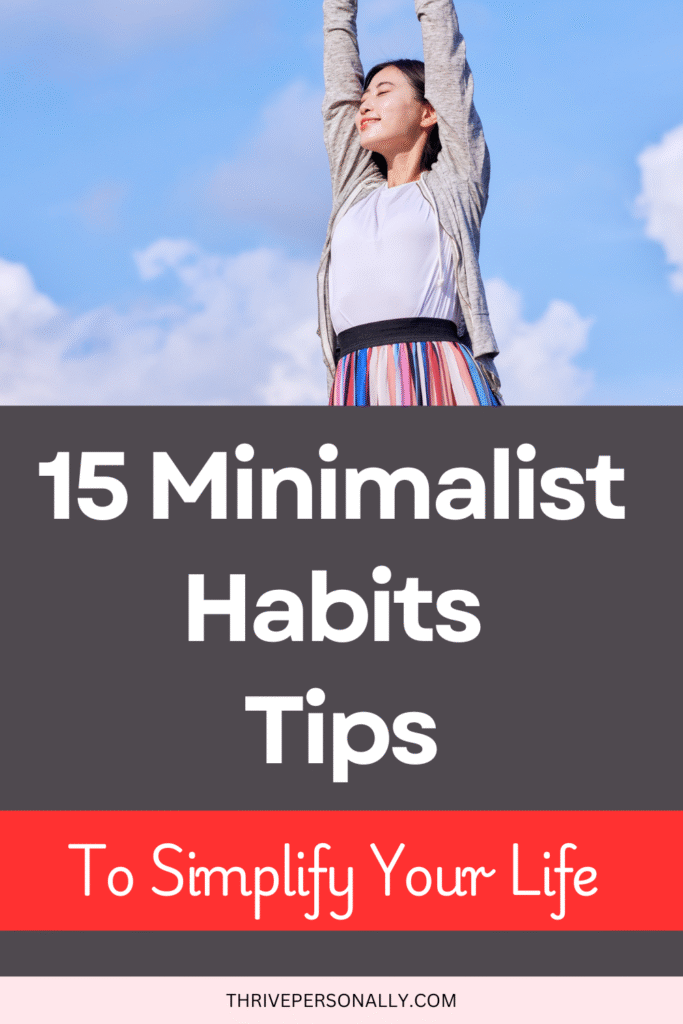I didn’t become a minimalist overnight. In fact, I used to be the kind of person who thought having more meant living better. My closet was full of clothes I barely wore, my desk was stacked with papers I never read, and my phone had so many apps I could barely find the ones I needed. It wasn’t just about stuff — my days were filled with commitments, noise, and distractions that left me drained.
Then one day, I realized something that shifted my entire perspective. I was spending so much time managing what I owned and what I did that I had no energy left to enjoy my life. I was busy, but I wasn’t fulfilled. That was when I started to strip things down. Not just my belongings, but my habits, my thoughts, and even the way I spent my time.
15 Minimalist Habits to Simplify Your Life
1. No Phone in the Morning
The change began in the quiet moments right after waking. I used to grab my phone immediately—checking messages, emails, news, and social media before I’d even had a thought of my own. My mind would be full of other people’s noise before I had my coffee.
Now, I spend my first minutes without my phone. I stretch, watch the light in the room, or simply sit. These moments remind me that I get to choose what starts my day.
Research shows that skipping your phone in the morning can reduce stress and improve focus (HuffPost). It’s not just about productivity—it’s about protecting my mental space.
Read also: 25 things to do instead of pressing your phone
2. One Small Space at a Time
When I first tried decluttering, I thought I had to tackle everything at once. Facing piles of paper, overstuffed cupboards, and messy drawers left me frozen.
So I started small—one drawer one day, the corner of my desk the next. Those little wins gave me momentum. Even a tiny cleared space can lift both the room’s energy and your mood.
3. Saying No More Often
Minimalism isn’t just about physical clutter—it’s about time clutter too. I used to say yes to everything because I didn’t want to disappoint people. But every unnecessary “yes” meant saying “no” to things that actually mattered to me.
Now, I say no more often. It’s not selfish—it’s protecting my time for what and who is most important.
Read also: 15 Reasons Why Saying No is a Life Skill You Need to Learn
4. Pausing Before Buying
In the past, I’d shop to fill boredom, relieve stress, or reward myself. Many of those purchases quickly turned into clutter and regret.
Now, before I buy something, I ask: Do I need this? Will I still want it in a month? This pause has saved me money, reduced waste, and made me more mindful.
Studies show that impulse purchases are more likely to lead to regret, while planned purchases bring more lasting satisfaction (Psychology Today).
5. Digital Decluttering
Minimalism applies to the digital world too. I had hundreds of unread emails, unused apps, and forgotten folders of photos. It was visual noise I didn’t notice until I cleared it.
Now I delete what I don’t need, organize my folders, and keep my home screen minimal. A clear digital space brings the same calm as a clean room—and it improves my focus.
Read also: 10 Simple Ways to Declutter Your Life
6. Simplifying My Wardrobe
I used to stare at a full closet and feel like I had nothing to wear. The truth was I had too much—clothes that didn’t fit, didn’t suit my style, or were bought impulsively.
Now I keep only what I love and actually wear. Getting dressed is quicker, my style is more consistent, and my mornings feel lighter.
7. The Nightly Reset
Before bed, I spend a few minutes tidying—washing dishes, clearing my desk, and putting things back in place. Waking up to a clean space makes mornings calmer.
It’s a way to close the day intentionally instead of letting clutter carry over into tomorrow.
8. The One-In, One-Out Rule
To keep clutter from creeping back, I follow one simple rule: if something new comes in, something old goes out. It applies to clothes, books, kitchenware—everything.
This habit makes me more mindful about what I bring into my life.
9. Shorter To-Do Lists
I used to make long to-do lists and feel like I’d failed even after getting a lot done. Now, I keep it to three to five important tasks per day.
Doing fewer things—and doing them well—has reduced stress and given me more satisfying days.
10. Embracing Silence
We’re surrounded by constant noise—on the streets, in conversations, through screens, and in our own thoughts. I now make space for quiet moments.
Sometimes it’s sitting still for five minutes, other times it’s walking without headphones. In that silence, my mind settles and I feel more grounded.
11. Reducing Multitasking
I used to think I was great at multitasking—until I realized I was doing more but doing it badly. Research from the American Psychological Association shows that multitasking actually decreases efficiency.
Now, I focus on one task at a time. It feels slower, but I get better results and feel less drained.
12. Letting Go of “Just in Case” Items
I kept things I thought I might need someday, but most sat untouched for years. Holding on came from fear of not having enough.
Now, I trust that if I truly need something in the future, I can find it again. That trust has freed me from unnecessary clutter.
13. Leaving Unscheduled Time
I used to keep my calendar packed—always busy, always rushing. But life isn’t a race with a finish line.
Now, I intentionally leave gaps in my day. I use them to rest, think, or seek inspiration. These unplanned moments are when some of my best ideas come.
14. Simplifying Meals
I once overcomplicated food—long recipes, huge grocery lists, and too much waste. Now I rotate a few simple, healthy meals.
It makes cooking faster, shopping easier, and reduces food waste. Eating feels simpler and more enjoyable.
15. Practicing Gratitude
Minimalism isn’t about having less for the sake of it—it’s about appreciating what you have. I make it a habit to notice the positives in my life every day.
Gratitude shifts my focus from what’s missing to what’s already here, and that’s the heart of living simply.
Closing Thoughts
Minimalism isn’t about empty shelves—it’s about a full life. These 15 habits haven’t just decluttered my home and mind—they’ve given me control over my days.
Whenever I return to them, I feel lighter, calmer, and more content. Minimalism creates space—space to think, breathe, and fill with what truly makes life worth living.
Save the pin for later


